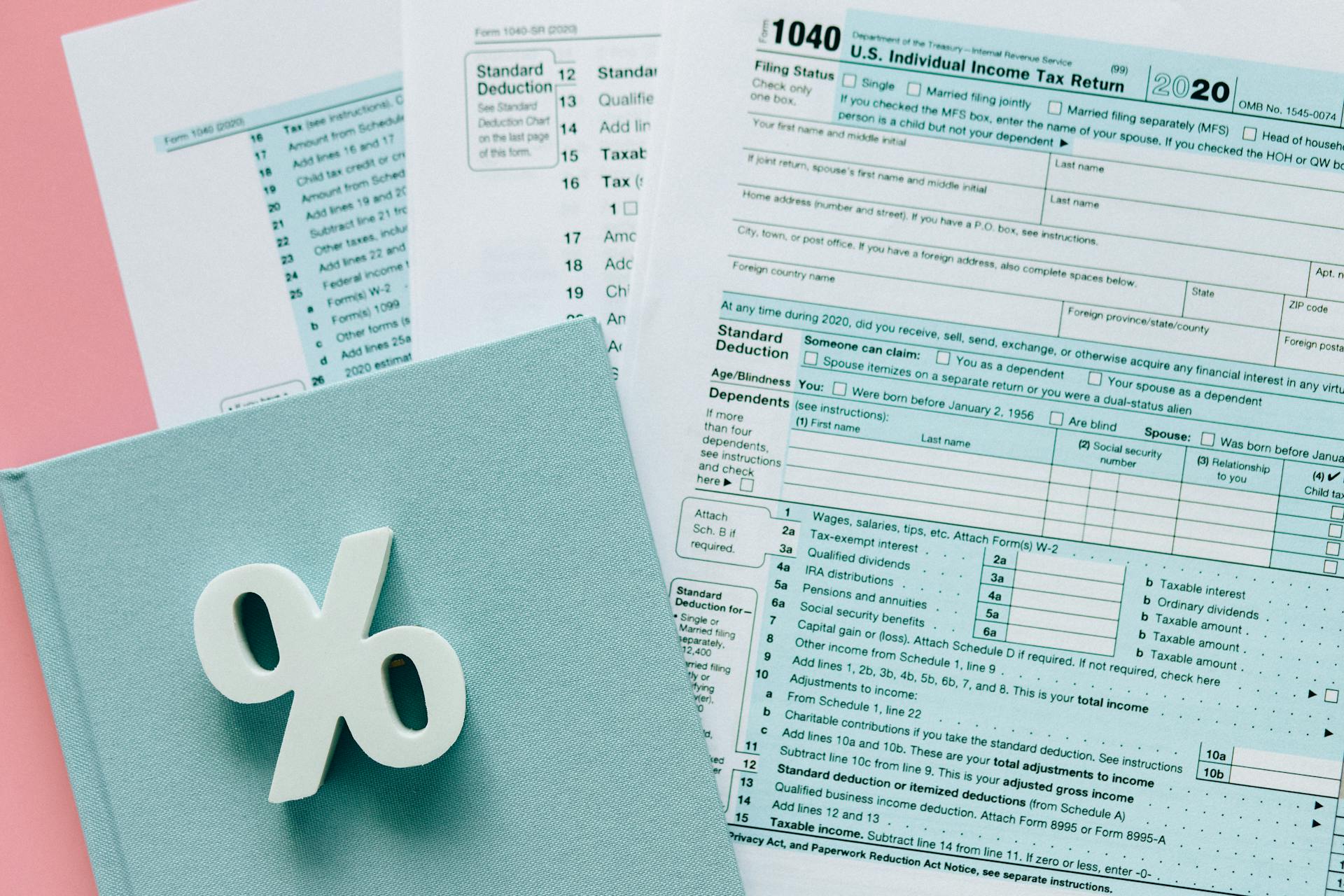
US Treasury bonds are a type of investment that's widely considered to be relatively safe and stable. However, one question that often comes up is whether they're taxable in the US.
Interest earned on US Treasury bonds is considered taxable income by the IRS. This means that if you hold a US Treasury bond, you'll need to report the interest earned on your tax return.
The good news is that US Treasury bonds are exempt from state and local taxes, meaning you won't have to worry about paying taxes on the interest earned at the state or local level.
Discover more: Ds 160 Monthly Income in Local Currency
Are US Treasury Bonds Taxable?
US Treasury bonds have unique tax implications, with interest income subject to federal income tax but exempt from state and local taxes.
This exemption can be particularly beneficial for investors in high-tax states, where they might otherwise face higher tax liabilities.
Interest income from Treasury bonds is always subject to federal income tax, regardless of where you live.
However, if you sell your Treasury bonds before their maturity, you may be subject to capital gains taxes.
The rate of tax applied to these gains depends on whether the gain is categorized as short-term or long-term, with the distinction made based on the criteria explained earlier.
Selling Treasury bonds before maturity can trigger capital gains taxes, which may impact your overall investment returns.
Discover more: Do Capital Gains Taxes Change My Income Tax Rate
Treasury Bond Taxation
Treasury bonds are subject to federal income tax but exempt from state and local taxes. This means you'll need to report the interest earned on your Treasury bonds on your federal tax return.
The tax treatment of interest income from Treasury bonds does not change based on the length of time the bond is held. However, capital gains taxes may apply if you sell your bond before maturity, with short-term gains taxed at your ordinary income tax rate and long-term gains taxed at a lower rate.
You can choose to report the interest earned on your Treasury bonds every year, even if you don't receive a 1099-INT. This can be beneficial if the child who owns the bond will be paying taxes at a lower rate in the future.
Worth a look: Long Term Government Bonds
Amortization of Bond Premium
The amortization of bond premium is a key concept in Treasury bond taxation. The amortizable bond premium is the price paid for a bond above its face value.
This premium is a part of the cost basis of the bond, and it can be tax-deductible. In fact, it can be amortized over the lifespan of the bond, which can be advantageous for investors.
Amortizing the premium can offset any interest income the bond generates, reducing an investor's taxable income.
You might like: 1099 Bond Premium on Tax Exempt Bonds
Annual Interest Reporting
You can choose to report the interest every year on your Treasury bonds, which may be beneficial if the bond is in a child's name and the child is paying taxes at a lower rate. You'll need to calculate the interest earned each year, as you won't receive a 1099-INT form every year.
If the bonds are in a TreasuryDirect account, you can easily see the interest earned each year in the account. This makes it simple to report the interest accurately.
Readers also liked: Is Interest from High Yield Savings Account Taxable
If the bonds are on paper, you can use the Savings Bond Calculator to figure out the interest to report. This will help you ensure you're reporting the correct amount of interest.
You'll receive a 1099-INT form at the end, which will show all the interest the bond earned over the years. To report interest already paid in earlier years, refer to IRS Publication 550, specifically the section on U.S. Savings Bonds.
On a similar theme: Interest on Us Savings Bonds and Treasury Obligations
How Tax Returns are Treated
When you're ready to file your tax return, it's essential to understand how Treasury bonds are treated. Interest income from Treasury bonds is subject to federal income tax.
The good news is that this interest income is exempt from state and local taxes. This can be a significant benefit for investors in high-tax states, where the savings can add up quickly.
If you sell your Treasury bonds before their maturity, you may be subject to capital gains taxes. The rate of tax applied to these gains depends on whether the gain is categorized as short-term or long-term.
On a similar theme: Short Term Us Treasury Bonds
To report your Treasury bond income on your tax return, you'll need to follow the guidelines outlined in the IRS's Publication 550, Investment Income and Expenses. This publication provides detailed information on how to report various types of investment income, including interest income from Treasury bonds.
Here's a quick rundown of the key tax implications of Treasury bonds:
Tax Treatment of Treasury Bonds
Treasury bonds, issued by the federal government, have unique tax implications. Interest income from Treasury bonds is subject to federal income tax but exempt from state and local taxes. This exemption can be particularly beneficial for investors in high-tax states.
If you sell your Treasury bonds before their maturity, you may be subject to capital gains taxes. The rate of tax applied to these gains depends on whether the gain is categorized as short-term or long-term.
Here's a breakdown of the tax treatment of Treasury bonds:
Capital Gains Taxes
Capital gains taxes can be a complex topic, but understanding the basics is key to making informed investment decisions.
If you sell your government bonds before their maturity date, capital gains taxes come into play. The tax rate applied to these gains depends on the length of time the bond was held.
Short-term gains from bonds held for less than a year are taxed at your ordinary income tax rate, which can be a significant factor in your net return. This is one reason why the holding period of your bonds can make a big difference.
Long-term gains from bonds held for more than a year are taxed at a lower rate, typically either 0 percent, 15 percent or 20 percent, depending on your income level. This can be a significant advantage for investors who hold their bonds for an extended period.
Interest income from Treasury bonds is subject to federal income tax but exempt from state and local taxes, which can be a big benefit for investors in high-tax states.
Check this out: Taxes on Deferred Compensation Withdrawal
If Ownership Changes
If ownership changes, it can affect how the interest earned on Treasury bonds is taxed. You owe tax on the interest the bond earned until it was reissued if you give up ownership of the bond.
The 1099-INT will reflect the interest you earned on your EE or I savings bonds, regardless of whether you're the old or new owner. When we reissue the bond, we report the total interest the bond earned so far on a 1099-INT in the name and Social Security Number of the person being removed (the previous owner).
The 1099-INT will only come when someone cashes the bond or the bond matures, and it will include all the interest the bond earned over its lifetime. You must prove to the IRS that a portion of the interest was previously reported to a different owner if you're the new owner who gets that 1099-INT.
Here's what you need to know about reporting interest on a reissued bond:
- We report the total interest the bond earned so far on a 1099-INT in the name and Social Security Number of the person being removed (the previous owner).
- We report only the interest earned after we reissued the bond in the name and Social Security Number of the person being paid (the new owner).
Government Obligations and Taxes
Interest on all federal government bonds is generally taxable for federal income tax purposes, but tax-free for state and local income tax purposes. This means you'll have to report it in the year you receive it.
Interest on Treasury notes and bills is paid either at maturity or at six-month intervals. You must report it in the year you receive it.
There's a special rule for Series I or EE U.S. Savings Bonds. While interest on these bonds accrues each year, if you're a cash-basis taxpayer, you don't have to pay tax on the interest until you cash in the bond.
Curious to learn more? Check out: What Are Non-conventional Cash Flows
Taxes on Government Work
Taxes on Government Bonds can be complex, but it's essential to understand how they work. Government bonds are subject to varying tax treatments at the federal, state, and local levels.
Treasury bills, notes, and bonds are subject to federal income tax but are exempt from state and local taxes. This means you'll have to pay taxes on the interest earned from these bonds.
Recommended read: Who Does Out of State Bonds
On the other hand, municipal bonds issued by state or local governments generally offer interest income that is exempt from federal taxes and often exempt from state and local taxes in the issuing state. Some states may choose to tax interest on their own bonds, while others may exempt specific bonds.
The tax treatment of interest income from bonds does not change based on the length of time the bond is held. This means you'll pay the same taxes on interest earned from a bond, regardless of how long you hold it.
Capital gains taxes may apply if bonds are sold before maturity. This is an important consideration when deciding whether to hold onto a bond or sell it early.
If this caught your attention, see: Bond Premium on Tax Exempt Bonds
U.S. Government Obligations
U.S. Government Obligations are generally not subject to state income tax, thanks to federal law. This means that interest on federal government bonds, such as Treasury notes and bills, is tax-free for state and local income tax purposes.
For more insights, see: Us Govt Treasury Bonds
Interest on these bonds is typically paid either at maturity or at six-month intervals. You'll need to report it in the year you receive it.
There's a special rule for Series I or EE U.S. Savings Bonds, which allows you to delay reporting and paying tax on the interest until you cash in the bond. However, you can switch to the annual reporting method without IRS permission, but you'll have to report and pay tax on all interest owed on all bonds to date.
Switching to the annual reporting method can be beneficial if your minor child was given U.S. savings bonds at birth or soon thereafter and you haven't been reporting annual interest. By switching to the annual reporting method in the year your child turns 18, you can avoid taxing the child's interest income at the parent's (usually higher) tax rate.
Here are some key facts about U.S. Government Obligations:
Keep in mind that there are some exceptions to this preemption, such as secondary or contingent obligations of the United States government.
Federal Preemption of State Tax

Federal preemption of state tax is a crucial aspect to understand when it comes to government obligations and taxes. This preemption means that income from direct obligations issued by the United States government is subject to federal income tax but is generally not subject to state income tax.
Federal law preempts states from taxing any income or gain from obligations of the United States. This is stated in 31 USC 3124, which provides a clear exemption for stocks and obligations of the United States Government from state taxation.
The preemption applies to each form of taxation that would require the obligation, the interest on the obligation, or both, to be considered in computing a tax. This means that states are prohibited from taxing income from direct obligations, such as Treasury bills, notes, and bonds.
However, it's essential to note that this preemption does not apply to secondary or contingent obligations of the United States government. Additionally, states are also preempted from taxing income from obligations of United States government-sponsored enterprises and agencies, as well as United States territories with specific language exempting them from state income taxes.
Here's a summary of the preemption:
Reporting and Savings
If you're considering investing in US Treasury bonds, it's essential to understand the tax implications.
You'll need to report your bond interest income on your tax return, typically on Form 1040.
Interest from Treasury bills and notes is considered ordinary income and is taxed as such.
Tax rates range from 10% to 37%, depending on your tax bracket.
You can choose to have your bond interest withheld at a rate of 24% or 37%, but this may not be sufficient to cover your tax liability.
The IRS requires you to report interest income from bonds with a face value of $10,000 or more.
You can also choose to save your bond interest income in a tax-deferred retirement account, such as an IRA or 401(k).
Frequently Asked Questions
Do you pay taxes on US Treasury bills?
US Treasury bills are exempt from state and local income taxes, but interest income must still be reported on your federal tax return.
Are treasury bonds taxed as capital gains or ordinary income?
Treasury bonds are generally taxed as ordinary income, not capital gains, and may be exempt from state taxes. However, the tax implications can vary depending on the specific bond and your individual tax situation.
Sources
- https://www.bankrate.com/investing/how-government-bonds-are-taxed/
- https://www.investopedia.com/articles/tax/08/bond-tax.asp
- https://www.cchwebsites.com/content/taxguide/text/c60s10d414.php
- https://www.michigan.gov/taxes/rep-legal/rab/rabhtml/2020/revenue-administrative-bulletin-2020-22
- https://www.treasurydirect.gov/savings-bonds/tax-information-ee-i-bonds/
Featured Images: pexels.com


